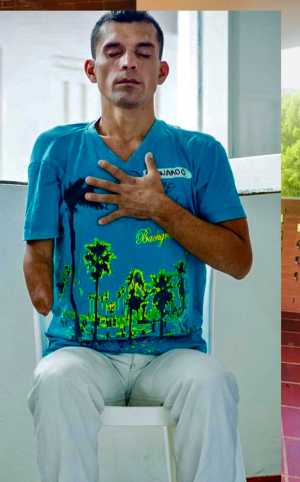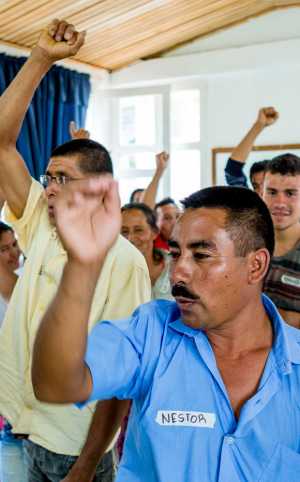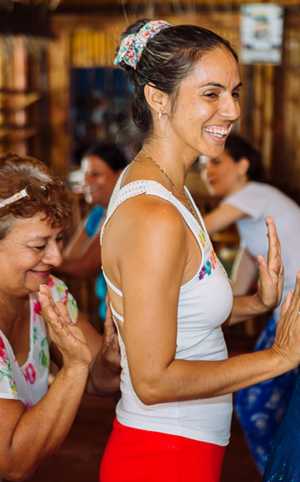The internal Colombian armed conflict has been taking place since the 1960s and continues to plague the civilian population. The main actors are the State, guerrillas, paramilitary groups, drug trafficking cartels, among others.
The causes of the conflict
Due to the long time and nature of the conflict, this has had different stages and moments where things have gotten worse.

There are several causes that gave rise to the Colombian armed conflict and very difficult to understand, but we can highlight the most important ones such as the weakness of the State (in the political, economic and social sphere). The continued conflict over land ownership, economic situation among the population, and the polarisation and persecution of the civilian population due to their political orientation.
To begin with, the unequal land distribution and the lack of spaces for political participation resulted in the use of violence and armed struggle. The armed struggle was reinforced with the emergence of drug trafficking.
Unfortunately, armed groups have justified the use of violence as the only method to transform their society.
One of the characteristics of the Colombian conflict is the number of particpants that have fed and transformed the armed conflict in the country. The main actors in the conflict have always been the traditional political parties and guerrilla movements. However, the emergence of different revolutionary, paramilitary groups and the influence of drug trafficking have marked the history of the country and its people.
Creating the foundation
Taking into account the sad reality in which Colombia has been immersed, Fundación Prolongar® was created in 1988 with the purpose of promoting the protection and integral development of communities, particularly the elderly.

In 2013, this organisation appeared on the path of the María Elisa Pinto. She is a Government and International Relations professional of the Externado University of Colombia and Magister in Peace and Conflict of the Tokyo University of International Studies (Fellow of JICA – Agency for International Cooperation of Japan).
Her extensive experience in various issues related to peace building and comprehensive victim help was perfect when a new leader for the foundation was needed. Thanks to this, it was possible to expand the scope of the foundation and to work in the promotion of a culture of peace through artistic tools and communication.
The importance of helping
Communities in Colombia have been affected by the armed conflict to such an extent that their survival / subsistence is threatened. In addition, to suffering from the difficulties they face in accessing basic services, the bonds of trust and relationships between the inhabitants have deteriorated, as well as their emotional and mental health. Also the mistrust and the anxiety in the territory makes difficult its projection towards future. So, it is necessary to take a comprehensive reparation measures that help heal and recover the potential and strengths of each population.
L.Viera A: Have you encountered absurd / difficult realities?
Fundación Prolongar: Yes, we have encountered absurd realities. It is difficult to believe the damage and suffering experienced by the inhabitants of the conflict-torn regions. Survivors’ accounts often refer to “absurd realities” such as being displaced from the territory, a victim of an atipersonal mines, had an amputation and no kind of help after after 5 or 15 years … all of this happened to the same person.
The needs
The levels of violence are so high that they go beyond the logics, the “rules of war “, imagined or expected.
The conflict has generated needs in the population. There are gaps in everyone’s hearts and between fear, lack of responsibility and wound healing, men, women and children are constantly affected.
This is why the foundation develops its work in specific thematic areas. These are: conflict transformation and socio – emotional skills, reconciliation, mental health and pisco – social assistance, promotion of the culture of peace and historical memory.

The idea is to design and implement methodologies for peace that adapt to the cultural context. The methodologies are: workshops, educational books, training of trainers and itinerant museums.
The goal is to change behaviours through artistic and communication tools such as movement and body language, music, drawing and role-playing.
Likewise, the team that forms the foundation wants to bridge the gap between art and public policy, systematising lessons learned and good practices of innovation for peace.
Sensitising and generating spaces of incidence from emotional and symbolic places around peace and reconciliation is paramount. We work hand in hand with cultural managers and artists in order to co-create staging or artistic works.
They also want to generate spaces to strengthen our networks and share information around art and peace by participating in conferences, radio programs, academic events, among others.
L.Viera A: All this sounds great, but I would like to know how they work exactly.
Fundación Prolongar: We have a methodology that seeks to positively transform thoughts, emotions and violent behavior through artistic tools and communication for peace.
L.Viera A: Okay, and why with art?
Fundación Prolongar: The organisation uses creative approaches because they can transform the reason and emotion of human beings, give new experiences through metaphors, express the what can not be said and learn to transform conflicts in a non-violent way, among other aspects. We work taking into account three levels of intervention: Individual exploration – self-inquiry. Interpersonal exploration – relationship with others. Community – relationship with the environment.

L.Viera A: How do you try to improve people’s quality of life?
Fundación Prolongar: Through practical and experiential exercises, participants have the possibility to explore in a constructive way, in a way of individual reflection and group dialogue. Through our workshops we can achieve changes such as: increase in body awareness, improvement in self-esteem levels, personal growth, empowerment, recognition of resources and strengths, promotion of a sense of community and partnership.
The objectives
In the medium term, we seek to contribute in the”postconflict” with the FARC and to consolidate a sustainable business model over time. In the long run, we want to offer our services to other countries that have been affected by war and violence. Our goal is to expand our services to Central America and other continents like Africa.
L.Viera A: How are we in Colombia facing the historical memory?
Fundación Prolongar: Colombia has advanced a lot, mainly in the construction of historical memory. Since the creation of the Memory Group, now National Memory Historical Center, the country has reconstructed the memory of emblematic events of the armed conflict, such as the massacre of El Salado, the tragedy of Bojayá, what happened in El Placer, among many others. Now we are also advancing in national reports that allow us to take a more global look at what has happened to us as a nation.

However, we still have a lot to do so that these memories reach all Colombians. Unfortunately, this messagee has been spread through books hat very few people know or read. Betting on websites, short videos, infographics, stories on radio and television, plays, museographic samples, etc. can be the output.
We provide them with tools for their daily lives, so that they can cultivate internal tranquility, improve their relationships and learn from the difficulty.
L.Viera A: How do you think art helps to promote a culture of peace?
Fundación Prolongar: The artistic tools allow to work cognitive and emotional aspects to transform the conflicts, especially to transform what Johan Galtung, father of the studies of peace, denominated “cultural violence”, that is that related to the precepts, values, attitudes, Prejudices, stereotypes and discourses that justify direct and structural violence.
They work with art because it allows a transformation.To change experiences through metaphors, to express the inexpressible verbally, to heal traumatic events. To learn to transform conflicts in a non-violent way from experience, to imagine and create different realities, among other aspects.

L.Viera A: What have you achieved so far?
Fundación Prolongar: We have been able to consolidate ourselves as one of the Foundations that contributes to the construction of peace and reconciliation in a serious and innovative way in Colombia. In 2013, we won the Ventures National Competition, the most important entrepreneurship competition in the country. It was in the category of “Innovation in Education and Culture” with the Foundation’s new business model focused on artistic tools for peace. Likewise, in 2016 we were winners of the “”Convocation of Good Practices, Experiences, Investigations and Peacebuilding Cases” at the VI Congress of the Global Pact Colombia. Also, last year, we won a scholarship from the Ministry of Culture to create the first itinerant museum of memory for antipersonnel mines in Colombia. All these achievements fill us with pride and we hope to be able to expand our work to more regions of the country.
What needs to be achieved
They would like to reach more people. Although they have already reached 10 departments in Colombia, it would be great to expand their reach.

True, Colombia has been hit by a conflict that instead of having an end seems to be crumbling every minute. However, foundations like Prolongar make possible a better future, a future that can be achieved.
They are taking advantage of one of their greatest potential: art! Communities not only have needs but also know-how, strengths and capacities that can be enhanced. Artistic expressions are one of the best ways to work with people and achieve important changes because they are a natural language of expression. They have decided to bet on the country, its people. We can only say infinite thanks for believing.


